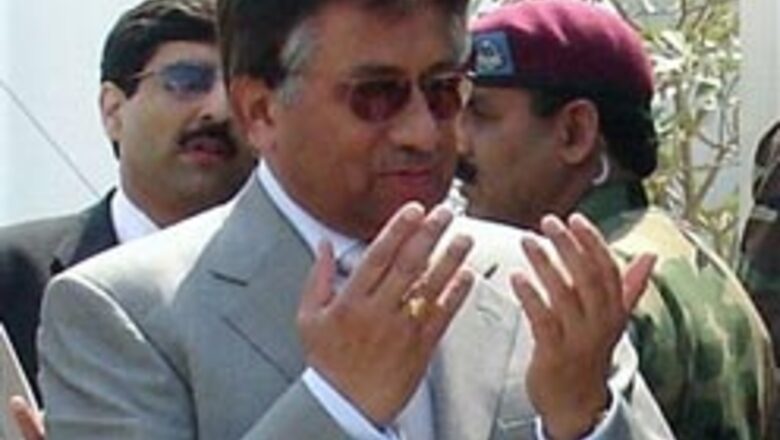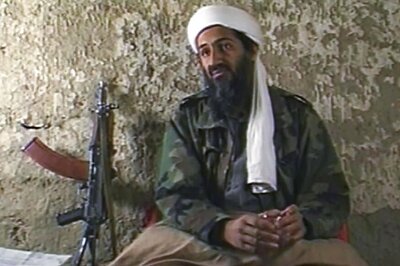
views
Will General Musharraf be elected President of Pakistan?
Yes, he will. But will he stay in that post for long? That will depend on what the Supreme court of Pakistan finally decides to do.
Gen Musharraf will be elected as President of Pakistan on the 6th of October. It is quite unlikely that the Supreme Court will intervene, despite petitions now challenging his election filed by two other contestants, Wajihuddin Ahmed, backed by the lawyers and Benazir Bhutto’s PPP head in Pakistan, Makhdoom Amin Faheem. This time, the Supreme Court cannot dismiss the petitions on the ground that there is no aggrieved party. The court is now forced to examine the substantive charges levelled against Gen Musharraf’s re-election. The court is also in no mood to clash with Gen Musharraf, going by comments of judges in the recent dismissal of petitions prior to filing nomination papers. Nor does the court have time to consider the matter sufficiently to provide relief before the 6th of October.
What about the resignation of members of the All Parties Democratic Movement (APDM) from the national and provincial assemblies?
It is a form of protest that will not directly affect the election of Gen Musharraf.
The president of Pakistan is elected by an electoral college comprising the National Assembly, the Senate and the four provincial assemblies of Sindh, Punjab, Balochistan and the North West Frontier Province (NWFP), with a reported total strength of 702. The numbers are with the ruling Pakistan Muslim League (Quaid) (PML-Q). It will certainly take away from the credibility of his win.
What is the relevance of the attempt to dissolve the NWFP assembly?
Dissolving the assembly would have meant taking away one constituent of the electoral college that votes in the president.
The ruling Jamiat Ulema e Islami (JUI) in the NWFP joined hands with the APDM to block Gen Musharraf’s election. However, the dates announced by the election commission have helped Gen Musharraf. 1st October was the last day of withdrawal and announcing the final candidates. So, the JUI decided to wait till 2nd October to recommend the dissolution of the NWFP assembly. The opposition in NWFP, the PML-Q and the PPP (Sherpao), quickly gave notice on Monday, 1 October, of a ‘No Confidence Motion’ against the Chief Minister of NWFP, Akram Khan Durrani. The amended 1973 constitution of Pakistan in force now, does not allow a Chief Minister facing a motion of ‘No Confidence’ to dissolve the assembly. The opposition in the NWFP has now also appealed on these grounds to the Peshawar High Court to declare any attempt to dissolve the assembly, illegal. The petition also claims that a recommendation of dissolution cannot be based on mere political expediency.
The irony is, the 2003 amendment of the 1973 constitution, that allowed President Musharraf to legalise his term, simultaneously holding the Army Chief’s post, was possible only with the help of the head of the JUI, Maulana Fazlur Rahman. Here too, it is the Supreme Court of Pakistan that will have the last word. It remains to be seen if the NWFP Chief Minister is able to prove his majority on the floor of the Assembly and then recommend its dissolution. That will raise legal questions as well. It is, in effect, highly unlikely before the 6th of October.
What is the relevance of the ‘deal’ between Gen Musharraf and Benazir Bhutto, in the form of an ‘ordinance’?
It is clear this new ordinance is neither ‘national’ nor a ‘reconciliation’.
News reports suggest that Gen Musharraf has already signed this ordinance and it will be released once the National Assembly meets in the next couple of days for the purpose of electing a new president. For the ordinance to have any meaning in the long term, the National Assembly needs to ratify it. The ordinance effectively grants Benazir Bhutto amnesty, but does not extend the same to Nawaz Sharif, although the ordinance talks of ‘national reconciliation’. It has already been panned in the Pakistani press as a tool meant to help Gen Musharraf build bridges with someone he has publicly reviled, namely, Benazir.
He is forced to do this for two reasons. One, the Americans see Benazir as a ‘liberal and moderate’ leader, which is completely ahistorical, and are pushing Musharraf to talk to her. Benazir Bhutto’s recent comments on allowing American access to disgraced nuclear scientist Dr. AQ Khan and allowing America access to militarily deal with Al Qaeda elements in the country’s north west, are desperate signs of her fear of losing American support for her in their talks with Gen Musharraf. Two, he needs as much political support as possible to look good when elected.
To keep Benazir Bhutto in line Gen Musharraf has not acceded to her request to bring about a constitutional amendment that will allow Benazir to run for Prime Minister a third time. His PML-Q members are not happy about allowing Benazir another crack at Prime Ministership. Musharraf can afford to wait this one out till he is convinced she is not a political threat. Given the great job that Shaukat Aziz has done in helping Pakistan recover economically, he also believes, the threat of Benazir can be countered politically.
Regarding reconciliation with Taliban elements in the country’s north-west, the less said the better. There is simply none in the ordinance.
Will the new appointments in the army that Gen Musharraf has made, allow him to breathe easy once he becomes President and actually sheds his uniform?
Yes, it will. That’s the whole idea.
The army has traditionally not seen the president as an ally. Now it will. The next chief is handpicked, a former ISI head, Gen Ashfaq Pervez Kayani. The next ISI head is Lt Gen Nadeem Taj, a man who as Military Secretary to Gen Musharraf, suffered with him the fright on the flight back from Colombo on 12 October 1999. Nawaz Sharif did not allow a civilian PIA flight carrying them to land in Karachi, leading to the coup. He has also reportedly survived an assassination attempt with Gen Musharraf. So are other appointments likely to help him keep the army and the government under control.
So, Gen Musharraf has seemingly covered all bases in his re-election bid, except for one. The Supreme Court of Pakistan, where each legal case is a potential time bomb.
However, quite apart from all the legal wrangling, here’s his principal problem. He may have ensured his smooth transition from being Army Chief to being a civilian President. However, he will still not have achieved what is of far greater importance to Pakistan… a smooth transition from dictatorship to democracy. Indeed, his successful re-election might just be the beginning of a regular and sanctified role for the army in government.
Musharraf is trapped in a dilemma: a dictator can never become a beloved democrat. History says no.
(Dr. Vidya Shankar Aiyar is a Senior Editor/Anchor at CNN-IBN)




















Comments
0 comment